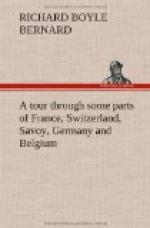The Guide to Paris informs us, that the city is divided into several quarters; that the vicinity of the Palais Royal, of the Thuilleries, and of the Chaussee d’Antin, are the most fashionable, and of course the most expensive; but that lodgings are to be met with on reasonable terms in parts of the city, which are fully as desirable, particularly in the suburb of St. Germain. There are furnished hotels to be met with on a large scale in that quarter, it having been mostly inhabited by foreign princes and ambassadors; and it was also much frequented by English families, as they considered it the most healthy and quiet part of Paris.
The Quarter du Marais was principally occupied by lawyers, financiers, annuitants; and, in short, all the Jews of the nation lodged there.
The Quarter of the Palais Royal is chiefly inhabited by sharpers, cheats, loungers, and idle people of all descriptions. Who could think that a space of ground not exceeding 150 acres, contains more heterogeneous materials blended together than are to be found in the 9910 acres (the French acre is one and a quarter, English measure) on which the city of Paris stands? It is the great mart of pleasure, of curiosity, and of corruption; and if the police wish to apprehend an offender, it is in the Palais Royal that they are sure to find him. Before the period of the revolution there were here but two public gaming houses; but at present the number is really astonishing. The police under Buonaparte did not discourage their increase; they argued that these houses were the rendezvous of all sharpers, villains, and conspirators; and that they often saved an ineffectual search for them in other quarters. A government like that of Buonaparte did not reflect, that these houses, which thus abounded with desperate characters, did not fail to perpetuate their number by the corruption which they caused in the principles of the rising generation; and many of the best informed Frenchmen are well aware that it will be the work of time, to recover their country from the demoralized state in which it was left after the government of Buonaparte.
On the subject of gaming a French writer has justly observed: “Quand il serait vrai que la passion du jeu ne finit pas toujours par le crime, toujours est il constant qu’elle finit par l’infortune et le deshonneur.” “Granting it to be true, that the love of gaming does not always terminate in crime, yet still it invariably ends in misfortune and dishonour.” But is it not rather improbable that those who have so far transgressed as to apprehend the vigilance of the police, should venture into the very places where they must be aware of immediate detection?




